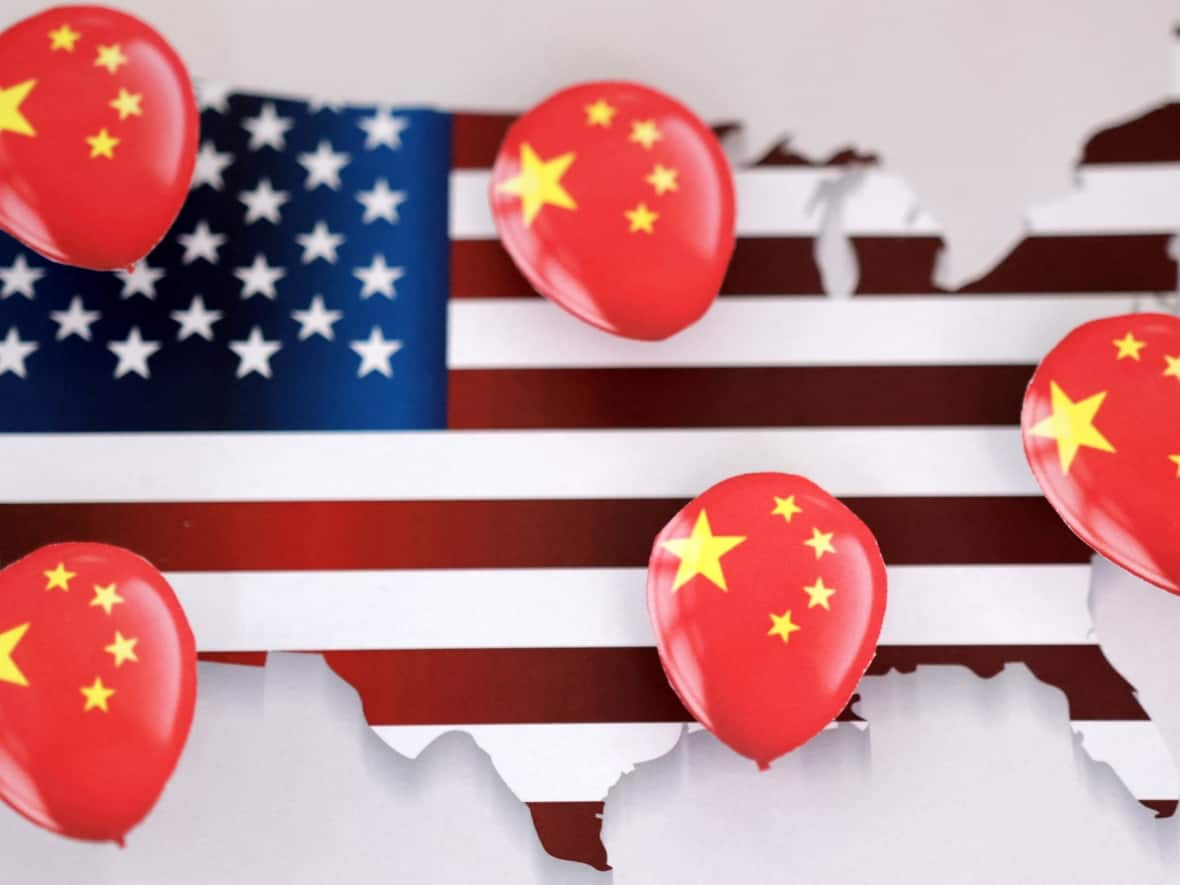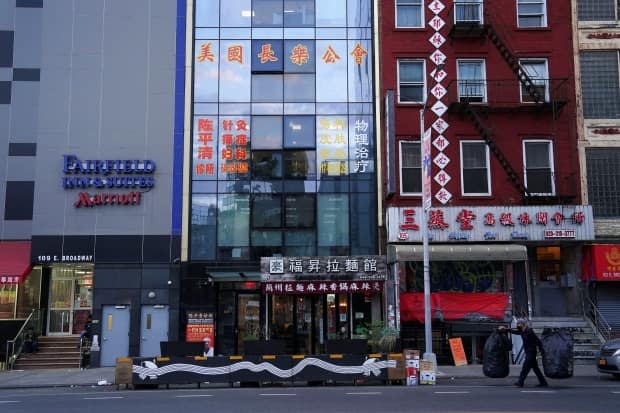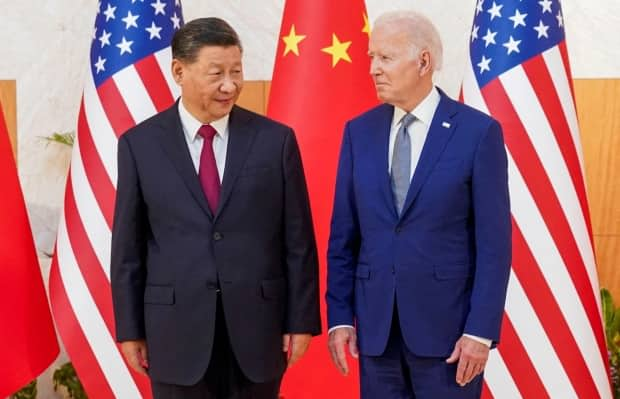The U.S. is cracking down on Chinese 'police stations' with a tool Canada still doesn't have

The United States has launched a crackdown on so-called Chinese police stations operating on its soil using a legal mechanism that doesn't exist in Canada, at least not yet — a registry of foreign agents.
U.S. authorities this week announced they had shut down what they referred to as a Chinese police station in lower Manhattan.
The criminal charges they laid were against two American citizens who allegedly failed to register their work on behalf of the People's Republic of China.
In vivid detail, authorities alleged the American suspects frantically tried to hide those foreign contacts.
They said one spent seven minutes in the bathroom during the raid on the so-called station, desperately deleting text exchanges with a Chinese state security official.
Such efforts to obscure communications triggered a second set of criminal charges against the two men, Chen Jinping and Lu Jianwang: obstruction of justice.
One is accused of helping a Chinese state security agent who was trying to locate a dissident living in California who had participated in 1989's pro-democracy protests in Beijing and recently ran for the U.S. Congress. The description matches that of Xiong Yan.
These are believed to be the first charges laid anywhere in the world against people suspected of running extra-territorial Chinese police stations. More than 100 such stations are alleged to exist worldwide, including in Canada.
U.S. Attorney for the Eastern District of New York Breon Peace said he was proud of that distinction. He called it surreal that an authoritarian state could set up a police outpost in the heart of Manhattan, near the Brooklyn Bridge.
He ended his remarks at a press conference with a message to the Chinese government: "We are on to you."
"We know what you're doing," Peace added. "And we will stop it from happening in the United States of America."
There are Canadian connections to the case — and not just because at least five such stations are believed to exist in Canada.

The indictment sheet says individuals from Canada and several other countries were at a 2022 ceremony launching Fuzhou municipal police offices around the world. The indictment sheet shows a photo collected from Lu's phone, allegedly of him attending that event with an official from China's Ministry of Public Security.
"It's huge," said Laura Harth, campaign director for Safeguard Defenders, the Spain-based NGO that has chronicled the existence of these stations using Chinese government open-source websites.
"[These arrests are] definitely being received as big news in all the other capitals in the democratic world where, maybe, authorities were not as proactive in investigating these police stations on their soil.
"So it's absolutely global news."

She said she's not complaining about Canada. In fact, Harth said, aside from the United States, Canada actually has done more than most countries to shut down these stations.
She credited Ottawa for opening an investigation and for giving community members a phone number (1-800-420-5805) and email (RCMP.NSIN-RISN.GRC@rcmp-grc.gc.ca) to contact if they're being harassed by staff from these stations.
Harth said she understands these investigations take time. "If we don't hear anything back in a year [from Canada], okay, we'll reassess," she added.
WATCH | Overseas police stations seen as part of China's 'repression campaign':
Three Canadian officials testified in parliamentary hearings last month that, while there have been no arrests here, the stations in Canada are being shut down.
A deputy minister of public safety, the interim commissioner of the RCMP and a deputy minister of international development all told MPs in March that these offices are closing.
RCMP Cmdr. Michael Duheme said officers were present in uniform, in marked vehicles, outside four sites. "Our understanding is they have ceased [operating]," he said, adding the investigation is ongoing.
Former federal official: Just copy the U.K. registry
As for a registry — the kind that led to the arrests in the U.S. — the Canadian government has opened public consultations on creating one. The two-month consultation period ends in May.
A former head of Canada's federal public service this week offered some advice to parliamentarians on how to speed things up — just copy the United Kingdom's plan.
Michael Wernick, the former clerk of the Privy Council, predicted before a House of Commons committee that a nearly-passed bill in the U.K. Parliament will wind up heavily influencing Canada.
"Go to Google. Get the U.K. national security bill, which is before the U.K. Parliament right now. And copy and paste it and bring it to Canada," Wernick said.
"You would be able to resolve these issues in a made-in-Canada model in a matter of months."
The foreign agents registry before the U.K. Parliament is in the final stages of adoption as part of a broader national security bill.
It carries a maximum two-year prison sentence for failing to register political-influence activities on behalf of a foreign power or foreign-controlled entity.
Australia also established a foreign agents' registry in 2018.
Chuek Kwan, co-chair of the Toronto Association for Democracy in China, said that country also has been more proactive on the problem than Canada.
"What are we waiting for?" Kwan said in an interview. "Hurry up, let's catch up to what Australia is doing."

Attempts to intimidate members of the Chinese diaspora are not new, Safeguard Defenders reports.
As early as the 1970s, it said, the Chinese Communist Party was seeking control over expatriates because of fears rooted in Chinese history.
A century ago, the Chinese worldwide diaspora played a role in toppling China's ancient imperial system of government.
"[And there's] a fear that this could happen again to the CCP," says one of Safeguard Defenders' recent reports.
The group said it has found evidence of 102 of these stations operating in 53 countries.
And it said it's found online statements from Chinese officials linking these stations to 83 cases of people being forced to go back to China.
Harth said she's convinced the actual numbers are far higher.
She cited evidence that thousands were forced to head back even before the Xi government created the Operation Fox Hunt repatriation initiative in 2014, which has resulted in U.S. charges against numerous Chinese officials in recent years.
One well-known China analyst said worldwide efforts to suppress dissent have unquestionably increased.
Bill Bishop, formerly based in Beijing and now the Washington-based author of the Sinocism blog, cites a few factors: the Xi presidency, China's greater global role and the emergence of new technology that makes it easier to follow dissidents.
"There was no such thing as WeChat [in the '90s] … There wasn't Twitter," Bishop said.
"It's definitely a different ballgame now."

The Chinese government insists it's being defamed.
Those so-called police stations, it says, were set up during the COVID pandemic to help expat citizens get public documents like driver's licences at a time when traveling home was harder.
Liu Pengyu, spokesperson for the Chinese embassy in Washington, said these sites are run by "warm-hearted local people serving as volunteers."
He also said the U.S. slandering Chinese law-enforcement efforts will only convince more Chinese criminals to seek refuge in the U.S.
"This is sheer political manipulation and the purpose is to smear China's image," Liu said in a media statement to CBC News.
Harth said she doesn't buy it.
She said her team's reports literally link to Chinese state- and state-media websites referring to these police stations, and to cases of people being forcibly repatriated, including successful and unsuccessful attempts at repatriation involving Canada or Canadian citizens.
Harth said that even if these were simple document centres, which they are not, the secrecy surrounding them would still violate Articles 2 through 5 of the Vienna Convention on Consular Relations.

Also, she said, why would police and a national security agency be in charge of setting up driver's licence centres?
At the end of the day, there's a simpler reality at play. At least in the U.S.
If you're working on behalf of a foreign government, according to U.S. law, you have to register that work in a public database that is searchable online. If you don't, it's a crime, and the maximum penalty is five years in prison.
The bottom line in that Manhattan case, Peace said, is that "[registration] didn't happen."


